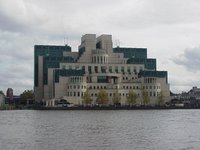Of the latter category, the one that most stands out is Iain Duncan Smith’s “The Quiet Man is turning up the volume” fiasco from 2003, closely followed by John Major’s solemn 1995 pledge to increase the number of pee-ing stops on Britain’s motorways.
But the one truly great conference address of those years was the one delivered by Tony Blair on the afternoon of Tuesday 2 October 2001, a little over three weeks after the 9/11 attacks had thrown the world into a state of turmoil.
Both as a piece of oratory, and as a superbly-judged response to the political demands of the moment, it is up there with all-time conference classics such as Neil Kinnock’s scourging of Militant in 1985 and Margaret Thatcher’s “Lady’s not for turning” from four years’ earlier.
"This is a moment to seize. The kaleidoscope has been shaken. The pieces are in flux. Soon they will settle again. Before they do, let us re-order this world around us,” the then Prime Minister told the Brighton gathering.
"Today, humankind has the science and technology to destroy itself or to provide prosperity to all. Yet science can't make that choice for us. Only the moral power of a world acting as a community can.
"By the strength of our common endeavour we achieve more together than we can alone.
"For those people who lost their lives on September 11 and those that mourn them; now is the time for the strength to build that community. Let that be their memorial."
But even though, ten years on, it is impossible not to admire Mr Blair’s passion and idealism, it is also impossible to escape the conclusion that his stated mission to "re-order the world around us" in the wake of the attacks proved to be a glorious failure.
More than that, it begs the question whether, in his subsequent foreign policy decisions – most notably the invasion of Iraq - Mr Blair himself contributed to that failure.
The former Prime Minister was right in his analysis that 9/11 was an opportunity to build a better, right to seek to articulate the hope that, out of this monstrous evil, some good could somehow emerge.
No, what was wrong was not the initial idea, but the subsequent execution of it by Mr Blair and other world leaders over the ensuing decade, which has, if anything, served to deepen rather than heal the world’s divisions.
Within that bigger picture thrown up by the shaken kaleidoscope of 9/11, there were a whole series of little pictures.
It was, for instance, the beginning of the end for Stephen Byers, the former North Tyneside MP who until then had been spoken of as a future Labour leader and Prime Minister.
His career never recovered from the revelation that his press officer, Jo Moore, had spent the afternoon of 9/11 telling colleagues it was now “a very good day to get out anything we want to bury.”
And if 9/11 marked the beginning of the end for Mr Byers, it also marked the beginning of the end for his erstwhile leader, as the Blair premiership was blown irretrievably off course by the ensuing global ramifications.
Most fundamentally of all – and ironically in the light of Mr Blair’s soaring vision of a new world order - 9/11 was the moment when politics ceased to be about selling people dreams of a better future and became more about protecting people from nightmares.
Until the economy returned to centre stage in 2008, the political agenda for much of the ensuing decade became dominated by security issues - a trend which only accelerated when Britain experienced its own ‘9/11’ on 7 July 2005.
At the time of the 9/11 attacks, it seemed barely imaginable to most of us that such a thing could happen, least of all on American soil.
But such has been its impact that, ten years on, it is now almost impossible to imagine a world in which it had not taken place.



